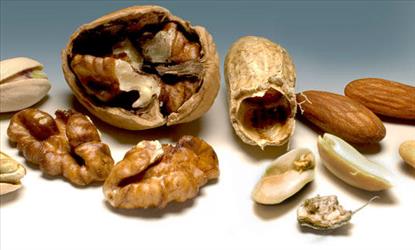
Best nuts for your diet:
Almonds, Cashews, Pistachios: All nuts are about equal in terms of calories per ounce, and in moderation, are all healthy additions to any diet. "Their mix of omega—3 fatty acids, protein, and fiber will help you feel full and suppress your appetite," says Judy Caplan, RD, a spokesperson for the Academy of Nutrition and Dietetics.The lowest-calorie nuts at 160 per ounce are almonds (23 nuts; 6 grams protein, 14 grams fat); cashews (16 to 18 nuts; 5 grams protein, 13 grams fat); and pistachios (49 nuts; 6 grams protein, 13 grams fat). Avoid nuts packaged or roasted in oil; instead, eat them raw or dry roasted, says Caplan. (Roasted nuts may have been heated in hydrogenated or omega-6 unhealthy fats, she adds, or to high temperatures that can destroy their nutrients.)
Best nuts for your heart:
Walnuts, While all nuts contain heart-healthy omega-3 fats, walnuts (14 halves contain 185 calories, 18 grams fat, 4 grams protein) have high amounts of alpha linoleic acid (ALA). Research has suggested that ALA may help heart arrhythmias, and a 2006 Spanish study suggested that walnuts were as effective as olive oil at reducing inflammation and oxidation in the arteries after eating a fatty meal. The authors of this study, funded in part by the California Walnut Commission, recommended eating around eight walnuts a day to achieve similar benefits.
Best nuts for your brain:

Peanuts, Technically legumes but generally referred to as nuts, peanuts are high in folate—a mineral essential for brain development that may protect against cognitive decline. (It also makes peanuts a great choice for vegetarians, who can come up short on folate, and pregnant women, who need folate to protect their unborn babies from birth defects, says Caplan.) Like most other nuts, peanuts are also full of brain-boosting healthy fats and vitamin E, as well. One ounce of peanuts (about 28 unshelled nuts) contains about 170 calories, 7 grams protein, and 14 grams fat.
Source: health.com




 click and follow Indiaherald WhatsApp channel
click and follow Indiaherald WhatsApp channel